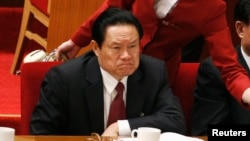China’s Communist Party leaders have approved a plan to boost rule of law in the world’s second largest economy, which highlights the need to abide by the country’s constitution, according to a communiqué released at the end of top-level meetings this week.
The party also approved the expulsion of several high-ranking officials during the meetings. However, the list of officials did not include former national security chief Zhou Yongkang, who was widely expected to be expelled at the conclusion of the talks that focused on rule of law for the first time in the party’s history.
Zhou’s possible expulsion is being closely watched, as he is the highest-ranking party member yet to be investigated for corruption. His case is seen as symbolic of the party’s pledge in its anti-corruption drive that no one is above the law.
Analysts say it is still possible the decision could come Saturday, though, when the party’s disciplinary commission meets in Beijing.
Anti-Corruption Struggle
Since President Xi Jinping began his rise to power two years ago, the Communist Party has launched an aggressive anti-corruption drive aimed at ridding it of a problem the party says threatens its very survival.
More than 50 high-ranking officials have already faced charges, but all of those investigations have begun first within the party. Legal experts say criminal investigators should handle corruption investigations, not the party.
The state-run Xinhua news agency says that during the closed-door meeting this week, Communist Party leaders agreed to take steps to boost judicial independence.
The meeting also agreed on major tasks to advance the rule of law in China, according to the communiqué. Measures include strengthening a “socialist system of laws with Chinese characteristics” that puts emphasis on the country’s constitution.
The report says the meeting also called for measures to strengthen the implementation of the constitution and highlighted the need for building a law-abiding government. But analysts say the meeting did little to set aside long-standing concerns the party remains above the law.
Xinhua says the meeting focused on the leading role the party should take in seeking to build rule of law in China and promote constitutional reform.
The meeting also urged the country’s parliament - the National People’s Congress - and the party’s Standing Committee to improve its supervision of the constitution.
Upholding the Constitution
What kind of changes this could bring was not immediately clear. Although China’s constitution was approved in 1982, critics have long accused the Communist Party of ignoring the document.
China’s constitution says, “no organization or individual has the privilege to overstep the constitution and the law.” It also guarantees basic rights such as freedom of speech, the press and the right to hold protests.
Shortly after Xi Jinping's rise to power began two years ago, he gave a speech in which he echoed that constitutional pledge of no one being above the law.
At the time, the comments were warmly welcomed by those hoping it was a sign China’s new leader would usher in civil society reforms. But since then the Communist Party has been carrying out a tireless campaign to silence dissent, both online and in public.
Individuals who have advocated for party officials to disclose their assets, a measure party members have openly supported, have been thrown in jail. As protests continue in Hong Kong, China has detained dozens for voicing their support of the Occupy Central rally.
Xinhua news agency says more than 360 full and reserve members of the party’s Central Committee, as well as experts and scholars, attended the meeting, which is called the Fourth Plenum.













